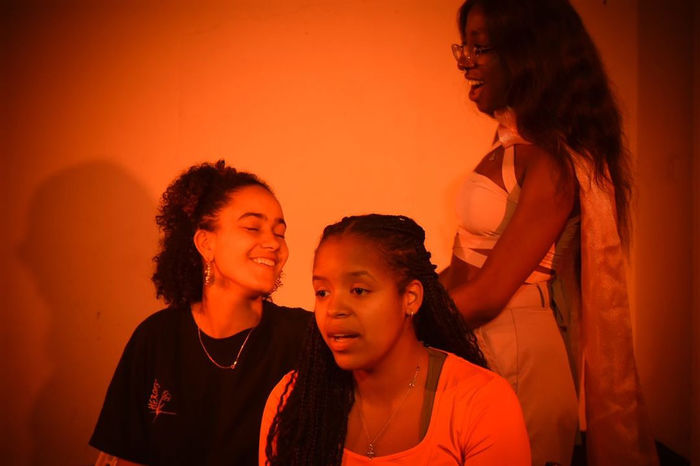In a Cave a Voice: A neolithic storyteller you can’t help but listen to
Bones, dreams, and a powerful performance. This show is a captivating tapestry of stories.

Animal-hide rugs, scattered spears, a campfire, and a semi-circle of chairs inviting you to sit; to listen. This is the stage for In a Cave a Voice at Pembroke New Cellars, a new in-person version of the acclaimed student-written show. Set in a neolithic cave, a girl (Poppy Charlton) tells you of her life—of magic, hunting, her dreams, her fears, her family—and their palpable absence.
New Cellars functions perfectly for this intimate performance, transforming into a neolithic cave through some well-considered props. A collection of animal-skin ‘beds’ surround a fire made very effectively from flickering tealights amongst logs, while an assortment of handmade spears, rudimentary knives, and bone needles lie around the floor. Every prop cultivates the neolithic setting, yet none are simply set-dressing; they each have a function and are drawn into the narrative at some point—Leslie Lampe’s consideration in making this set comes across strongly. This is fortunate, considering there is nothing else to create the cave—the lighting is…well, a light.
Ella Muir’s costume design is highly impressive, creating coat and trousers that truly look stitched from animal hides. The sound design was not as crafted. It faded in nicely at points of tension, but then cut out abruptly, jolting the audience out of the scene.
“Sat in New Cellars, you are less spectators, more a chorus”
Poppy Charlton gives a captivating performance as the unnamed protagonist. She delivers the weaving narratives with considered pacing, fluctuating with the stories to avoid the monologue growing tedious. Charlton creates an emotive, rich image of this character: powerful yet vulnerable, each emotion is readable in her face, flickering from fear, to joy, to uncertainty.
There is nowhere to hide for Charlton. The arrangement of the stage has the audience sat encircling the ‘cave’, and with only a handful making up the audience, this is a very intimate theatre experience. Charlton comes out and assesses her audience, locking eyes and demanding “who are you?”. This is one of the most impressive aspects of her performance, as she manages to hold the gaze of her chosen subject just long enough to make them squirm. Her questions are insistent enough that you wonder: Are we meant to reply? What happens if we do?
Rebekah King’s script is engaging; written with a lyrical voice, the different tales flow into each other, moving the play seamlessly from topic to topic. However, it never pushes to truly existential depths. There are many stories about family, love, fear, faith, death, but they are always about this girl’s life; they never make us question our own.
Although perhaps this isn’t needed. This production is a captivating tapestry of stories, given emotional presence by Poppy Charlton; it is engaging without existential questions. And, perhaps, more interesting is its rethinking of the role of the audience. Sat in New Cellars, you are less spectators, more a chorus—watching a girl who watches you, talks to you, demands answers from you. But do you dare break your character as an audience member and respond?
 News / Caius mourns its tree-mendous loss23 December 2025
News / Caius mourns its tree-mendous loss23 December 2025 News / Clare Hall spent over £500k opposing busway 24 December 2025
News / Clare Hall spent over £500k opposing busway 24 December 2025 Comment / The ‘class’ of Cambridge24 December 2025
Comment / The ‘class’ of Cambridge24 December 2025 Interviews / Politics, your own way: Tilly Middlehurst on speaking out21 December 2025
Interviews / Politics, your own way: Tilly Middlehurst on speaking out21 December 2025 Comment / Yes, I’m brown – but I have more important things to say22 December 2025
Comment / Yes, I’m brown – but I have more important things to say22 December 2025








